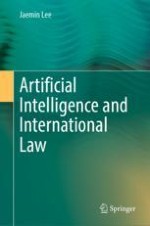2022 | OriginalPaper | Buchkapitel
4. New Issues Raised by AI
verfasst von : Jaemin Lee
Erschienen in: Artificial Intelligence and International Law
Verlag: Springer Nature Singapore
Aktivieren Sie unsere intelligente Suche, um passende Fachinhalte oder Patente zu finden.
Wählen Sie Textabschnitte aus um mit Künstlicher Intelligenz passenden Patente zu finden. powered by
Markieren Sie Textabschnitte, um KI-gestützt weitere passende Inhalte zu finden. powered by
